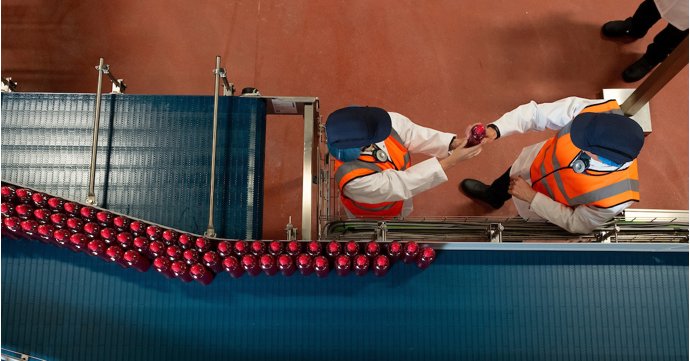Suntory Beverage and Food Great Britain & Ireland, which is based in Coleford in the Forest of Dean, has revealed a new, sustainable design for its Lucozade Energy brand.
The firm invested £6.3 million to reduce the amount of plastic in its bottles, transitioning from a full plastic sleeve to a half sleeve and including a new 'embossing design' to highlight Lucozade’s 'Arc’ logo.
The new half sleeve will cover 50 per cent of the bottle's height compared to the previous full-length sleeve, resulting in a 60 per cent reduction in weight.
Suntory has calculated that the change will save enough water to fill an Olympic-sized swimming pool every 289 days and reduce plastic by 956 tonnes annually.
Part of the £6.3 million investment includes the installation of new 'sleevers' – which come complete with updated technology – across three different production lines at Suntory’s factory in Coleford.
Karl Ottomar, supply chain director at Suntory, said: 'As one of the biggest energy brands in the UK, producing over 3,000 bottles of Lucozade Energy per minute, this has been a complex and large-scale change for our factory.
'While reducing a drink’s sleeve size may sound simple, it has required a full redesign of the bottle and complete change in componentry on our production lines.
'The team has dedicated thousands of hours to plan and then successfully implement the changes on our lines and I’m so proud of their incredible commitment to this project and helping us meet our sustainability goals.'
Suntory has committed to making all of its packaging 100 per cent sustainable by 2030, with the new Lucozade bottles supporting 'bottle to bottle recycling', meaning that each bottle can be sorted and made into new bottles.
Paul East, head of packaging, recycling and design at RECOUP, a recycling charity and independent advisory service, added: 'RECOUP are proud to have been part of the journey to redesign the Lucozade Energy bottle.
'This new design meets recyclability guidelines, meaning the bottles can be easily sorted at recycling centres and reduces the amount of overall plastic produced.
'The next step is to encourage more consumers to dispose of the bottles correctly, in the certainty that the bottle will be detected and recycled.'





















